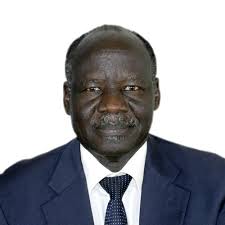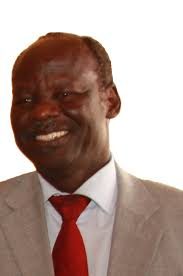
STATEMENT BY
H.E. FESTUS G. MOGAE
CHAIRMAN OF THE
JOINT MONITORING & EVALUATION COMMISSION TO THE
18th JMEC PLENARY
WEDNESDAY, 12th July 2017
JUBA, SOUTH SUDAN
Honourable Ministers, Your Excellencies, Ladies and Gentlemen.
1. I welcome you all to our July plenary, the 18th such meeting since this body was established.
2. Last Sunday, the 9th of July, South Sudan marked six years of independence. The birth of this nation in 2011 was a truly joyous moment for us all. This joy was well deserved, given the long and brutal struggle for independence endured by this country. It is unfortunate, however, that for the last four years, since 2013, there has been very little to celebrate as a result of the persistent senseless violence.
3. Three weeks ago, on the 20th of June, we marked World Refugee Day. This is a particularly significant day for us here, given that South Sudan has now become the fifth highest global contributor of refugees.
4. According to the UN OCHA Humanitarian Bulletin of 28 June 2017, at least
1.9 million South Sudanese are seeking refuge in neighbouring countries, another 1.9 milllion are internally displaced, and an estimated 6 million people are food insecure. The increase in displacement of civilians over the past year and the consequent humanitarian catastrophe is truly shocking.
5. I dedicate my opening remarks today to the refugees, internally displaced persons and all conflict affected populations, and offer a message of hope and reassurance. As members of JMEC, individually and collectively, we understand your plight and reiterate our commitment to the restoration of peace and security in this country.
Honourable Ministers, Excellencies, Ladies and Gentlemen;
6. A few days ago, CTSAMM have confirmed an outbreak of fighting in some places. I condemn this violence and I take this opportunity to again reiterate our demand to all armed groups in South Sudan, especially forces of the SPLA-IG and SPLA-IO, to immediately and permanently stop fighting and end all acts of abuse and violence against civilians.
7. The security, humanitarian and economic situation in the country remains fragile and precarious. With the onset of the rainy season, aid delivery is further complicated. The conflict affected population and internally displaced persons continue to endure dire humanitarian conditions.
8. I call upon the TGoNU to ensure a secure environment for humanitarian workers and to guarantee unhindered humanitarian access, including reconsideration of any prohibitive fees and levies that may obstruct operations of humanitarian agencies.
9. I commend the international community for its continued support to alleviate this humanitarian crisis but further appeal for more support to meet the resource gap, which currently stands at 48.6 percent.
Honourable Ministers, Excellencies, Ladies and Gentlemen;
10. I have been briefed by the Chairpersons of the JMEC Joint Working Committees and take note of the modest progress that has been made in the implementation of the Peace Agreement. I urge all members of the Working Committees to actively participate in their committees’ work. Your assessments and recommendations will be invaluable to the peace process going forward.
11. In particular, I want to point out the good progress that has been made by the National Constitutional Amendment Committee towards the review and amendment of relevant legislation. I reiterate my call to the TGoNU to expedite the Constitutional Amendment process.
12. I welcome the pledge of one million USD by the TGoNU to support Chapter Two mechanisms and commend the SDSR Board for its commitment to finalise the key policy frameworks by the end of August.
13. I welcome the recent graduation of the first batch of the Joint Integrated Police, noting however that they graduated without the background vetting that is required by the Permanent Ceasefire and Transitional Security Arrangments. It is important that the TGoNU adhere to agreed requirements for implementation of the various components of the Peace Agreement.
14. On the economy, I welcome the efforts of the TGoNU to push forward with the institutional and public finance reforms. This remains critical in ensuring increased transparency and accountability in government finances. Good progress has been made towards the setting up of a Single Treasury Account and the closure of some petroleum revenue accounts.
15. However, there is need to step up efforts in other areas such as review of legislation to improve the functionality of the Anti Corruption and the Land Commissions. The TGoNU should press ahead with the implementation of the Revenue Authority and measures aimed at increasing non-oil revenues.
16. I also commend the TGoNU for embarking on the process of designing and implementing a 3 – 5 year National Development Strategy. The economic challenges, once peace is secured, are immense, not least the return and reintegration of IDPs and refugees.
17. On the important work of promoting reconciliation and healing, I am informed that the Technical Consultative Committee for the establishment of the Commission for Truth, Reconciliation and Healing recently conducted a round of sensitisation and awareness missions in Bor, Torit, Yambio, Rumbek, Wau and Malakal. This is a welcome initiative, even though conditions necessary for successful consultations are far from optimal.
18. Regarding the establishment of the Hybrid Court Court for South Sudan, I am informed that the Africa Union Commission Office of the Legal Counsel has now developed drafts of the key legal instruments. These instruments include the Statute, a Memorandum of Understanding and a Host Country Agreement. However, consultation between the Africa Union Commission and the TGoNU to finalise these instruments have not taken place.
19. I recommend that the TGoNU meet with the Africa Union Commission to conclude these agreements without further delay. This will signal a commitment to hold perpetrators to account and demonstrate that impunity will no longer be tolerated.
20. I am concerned that the Permanent Constitution-making Process is yet to commence. The Permanent Constitution is mandatory for organizing elections at the end of the Transitional Period. Even though we are clearly out of time at this stage, immediate steps can be taken to review and reconstitute the National Constitutional Review Commission to prepare to undertake this important task once the process begins. Again, this is one area where the delayed completion of the Constitutional Amendment process has a direct impact, and I call upon the TGoNU to expedite this process.
Honourable Ministers, Excellencies, Ladies and Gentlemen;
21. I now turn to the important new development from the IGAD Heads of State and Government Summit of 12th June 2017.
22. Since July 2016 when fighting broke out, violence has escalated, the opposition has fractured and new armed groups have emerged.
23. Over the last few months, confronted by unprecedented hostilities targeting civilians, resulting in the increase of refugees and internally displaced persons and an appalling humanitarian crisis in the country, we posed the following questions – How do we stop the fighting? How do we stop people dying of starvation? And how do we ensure inclusivity of all parties, communities and stakeholders in the peace process?
24. Because of these shared concerns, I conducted extensive consultations with the parties, IGAD leaders, JMEC Partners, and key stakeholders, pointing out that the current situation is not conducive for the implementation of the Peace Agreement. I appealed to IGAD, AU and the UN to speak with one voice and demand cessation of hostilities and the restoration of the permanent ceasefire.
Honourable Ministers, Excellencies, Ladies and Gentlemen;
25. Accordingly, IGAD held an Extra-Ordinary Summit of Heads of State and Government in Addis Ababa on 12th June 2017 and, following my recommendation, they decided to convene a High-Level Revitalization
Forum of the parties, including estranged groups, to discuss concrete measures to:
I. restore the permanent ceasefire,
II. return to full implementation of the Peace Agreement and
III. develop a revised and realistic timeline and implementation schedule towards democratic elections at the end of the transition period;
26. The IGAD leaders mandated the IGAD Council of Ministers to urgently convene and facilitate this Forum in collaboration with relevant stakeholders; and directed the Chairperson of JMEC, and the Executive Secretary of IGAD to provide the necessary secretariat and logistical arrangements.
Honourable Ministers, Excellencies, Ladies and Gentlemen;
27. As JMEC we should all welcome this timely decision of the IGAD leadership and seize the opportunity to end the senseless fighting, revitalise the implementation of the Peace Agreement and restore hope and aspiration for the people of South Sudan.
28. The revitalisation of the implementation of the Peace Agreement is NOT a renegotiation. We should explore options that can restore activity and prominence of the peace process. It is our hope that this revitalisation process will be pursued in the spirit of peace, inclusivity, sensitivity and compromise.
29. I hope that all reasonable and positive proposals to restore and reinforce effective implementation of the Peace Agreement will be put forward, discussed and considered at the Forum. I encourage all Parties and estranged groups to sieze this opportunity to put the country first, make compromises and accommodate one another for the sake of peace.
Honorable Ministers, Excellencies, Ladies and Gentlemen;
30. Pursuant to this mandate, the IGAD Council of Ministers met on 02nd July 2017 and adopted guidelines and an indicative matrix for the convening of this High Level Revitalisation Forum within three months. The process of convening will consist of three phases, namely: a pre-convening preparatory phase, a convening phase and finally an implementation phase.
31. The pre-convening phase will include consultation with JMEC members and key stakeholders, the identification of the appropriate participants and issues for the Forum. In this regard, the respective JMEC Joint Working Committees are required to prepare a status report on the implementation of the Peace Agreement. Other consultations will be with the JMEC Partners Forum.
32. The Chief of Defence Forces of the Troop Contributing Countries, the TGoNU, and UNMISS have been called upon to meet and determine a definitive timeline for the full deployment of the Regional Protection Force.
33. The IGAD Council of Ministers is working towards a convening date of the High Level Revitalization Forum on 22 September 2017.
Honorable Ministers, Excellencies, Ladies and Gentlemen;
34. This three-stage revitalization process is intended to ensure the broadest possible consultation with stakeholders, and to generate proposals that could make the Peace Agreement implementation more accommodative, viable and sustainable.
35. Ultimately, the success of this process will require a willingness on the part of the Parties to the Peace Agreement and estranged groups to compromise and accommodate one another politically.
36. A window of opportunity has arisen and we must all seize it. I believe that with a resolute and unified approach by IGAD, the African Union, UN and the International Community, and with cooperation from the South Sudanese leaders, we can recover lost ground and restore hope to the people of South Sudan.
Honorable Ministers, Excellencies, Ladies and Gentlemen;
37. I conclude with the following recommendations and expectations of this Plenary:
a. We demand a total cessation of violence around the country and a commitment by all parties and groups to pursue a political path to reconciling their differences;
b. We welcome and commit to the revitalisation of the implementation of the Peace Agreement, and call upon all parties and estranged groups to seize this opportunity and make concrete proposals for consideration at the Forum;
c. We call for the immediate deployment of the Regional Protection Force to build confidence and encourage a return to inclusive implementation of the Peace Agreement;
d. We urge the TGoNU to immediately conclude the Constitutional Amendement process, and to initiate the Permanent Constitution- making Process;
e. ABOVE ALL we demand a sustained improvement of the conditions for delivery of humanitarian assistance; and finally,
f. We urge full cooperation of all Parties and groups to fulfil the mandate of the Revitalisation Forum.
38. I expect this Plenary to:
a. receive a briefing from the TGoNU on recent progress made in implementing the Peace Agreement;
b. receive an update from TGoNU and UNMISS on the current humanitarian situation, in particular on steps taken to facilitate unfettered humanitarian access;
c. receive summary reports on the status of the various boards and commissions of the Peace Agreement and the progress towards their objectives; and,
d. welcome the progress that is being made by the various JMEC Working Committees, commend the Chairpersons and members for their commitment and contributions.
39. Finally, I take this opportunity to thank all our partners in TGoNU, the other South Sudanese stakeholders, IGAD, AU, Troika, EU, China, the UN, UNMISS, and the International Partners and Friends of South Sudan for their commitment and continued support to JMEC, and appeal for full support for the revitalisation process.
40. May God bless us all and continue to guide us in the relentless pursuit of peace.
Editor’s Note: The views expressed in the “Documents Page” are solely the opinions of the writers. The veracity of any claims made are the responsibility of the author’s and are not necessarily endorsed by The Malakal Post. The Malakal Post, reserves the right to edit articles before publication. If you would like to submit an opinion article or analysis, please email your article at: info@malakalpost.com















